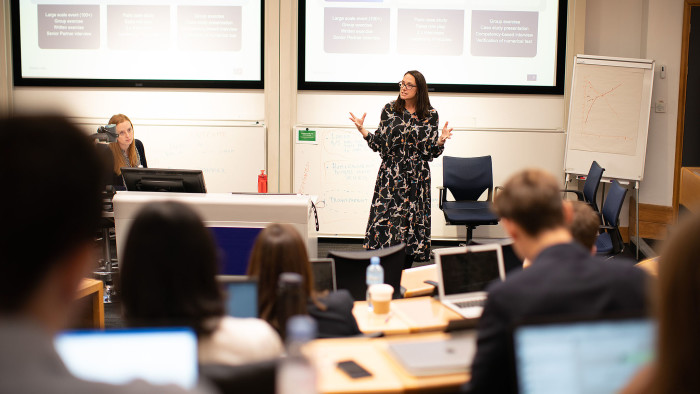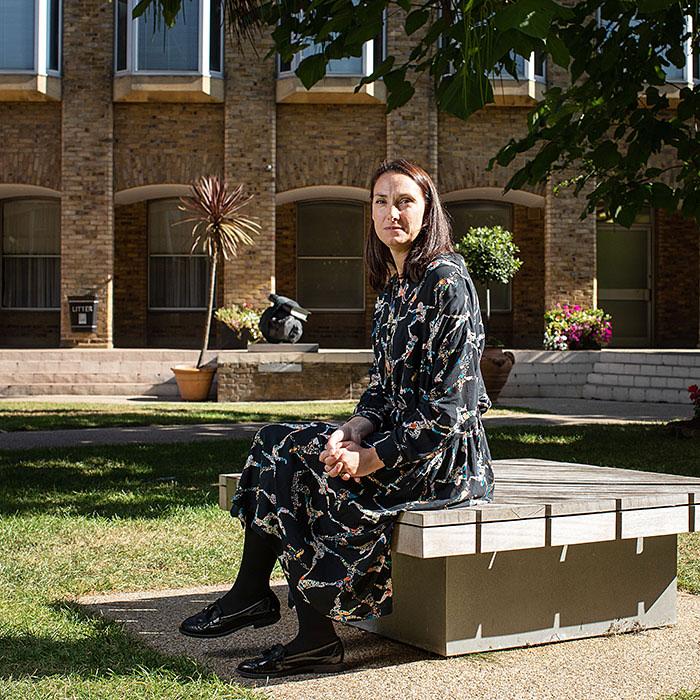How business school careers services get graduates on track

Roula Khalaf, Editor of the FT, selects her favourite stories in this weekly newsletter.
Sara Ramos, a Spanish aeronautical engineer, knew she wanted a business degree to develop new skills and realise her long-term aims. But she spent much of her time at London Business School on activities outside the classroom to question and test her goals and ultimately accelerate her progress towards them.
“There was no careers centre at my previous university, and no help in finding a job,” she says. “I had never written a cover letter in my life. At LBS, there were so many resources, access to companies and ways to gain a strategic foundation to help me explore other things. I was trying to look at all possibilities.”
Ramos’s experience points to broader lessons for students on masters in management (MiM) programmes about how to take full advantage of the opportunities to explore their interests and personalities, and to cultivate, confirm or change their career.
“The masters is an investment and you have to get the best out of it,” she says. “Many students think they will study, then after the year is finished explore what they want to do. That doesn’t really make sense. You should be as proactive as you can, make best use of all the resources, talk to as many people as possible and see what life is like for them.”
Business schools have different reputations for the expertise they provide and the career opportunities they open up, reflecting their history, programmes, faculty expertise and the job markets they tap into through location, alumni and international networks.

At Bocconi in Milan, for example, Massimo Magni, director of the MSc in international management, says a third of his students go on to work for consultants such as McKinsey, BCG and Accenture. A fifth move into consumer goods and a similar proportion into finance. A common thread is that half are working outside Italy within a year of graduating. “Employers want flexibility, creativity, adaptability, an international mindset: people who are able to adapt and learn fast,” he says. “We try to develop students who will become citizens of the world.”
Julien Manteau, director of strategy and development for masters programmes at HEC near Paris, says about half of his intake goes into consulting after finishing the course, with the balance moving into a variety of careers, including a small but growing share of entrepreneurs.
At London Business School, careers manager Kira Hughes says three-fifths of MiM students initially aspire to consultancy and two-fifths go on to work in the sector. Next are finance, notably investment banking, and companies in technology as well as consumer goods, healthcare and energy. A small number start their own companies directly after their studies.

Typically, MiM students will have only worked for short periods, so advisers suggest they spend time exploring their options. “They are trying to identify the skills they want to develop, the roles to go into and the environment in which they will work best,” Hughes says. She emphasises exchanging ideas with LBS’s alumni and more experienced students on programmes such the MBA and EMBA.
Presentations and placements allow students to test their knowledge and explore careers and specialisms they may not have considered. “Sales roles are less fashionable than marketing, but sales is growing,” says Bocconi’s Magni. “Bringing knowledge of the product or service to the market is an important function.”
Advisers also stress the importance of learning about yourself. “You need to know your values, culture, motivation, who you are and whether you will fit in, rather than following peer pressure,” says Raphaëlle Gautier, executive director of HEC’s career department. “Don’t just look at the next job, but consider the long term. Think about a career path. Happiness is not just the next steps.”
Case study

Edoardo Positano took the two-year China MiM in international management from 2017, studying at Fudan University School of Management in Shanghai and Bocconi University in Milan. He is now a management consultant with Roland Berger in Milan.
What advice would you give to students?
Be open to suggestions from people with more experience. Students should not stop at the first opportunity, before looking into a few different options first to see what works best for them. Since we spend most of our time working, it is important to enjoy what we do. People should fully understand their passions in order to transform them into a job.
How should they prepare for interviews?
Students should attend conferences and other networking events to exchange opinions with industry insiders, or reach out to them on LinkedIn for an informal chat. People should prepare for an interview as they would for an exam — being persistent and to the point.
Tatjana Mitevska
Magni agrees: “There are many different paths that can fulfil your aspirations. You shouldn’t fake your personality or your attitudes. A career is not being a CEO [or] necessarily earning a certain amount of money, but having an impact and enjoying what you are doing.”
For employers, “hard” skills remain important, including ever rising demand for digital knowledge and technological competence. But a common theme across business schools is the growing search for broader attributes in future managers. “Soft skills are really becoming key,” says Manteau. “Of course, students have to have very solid technical hard skills. But employers also want people skills: how they integrate in a group, work with people from other countries and cultures, show an inclusive mindset.”
That is driving changes in how employers hire. “There is a move away from typical competency-based interviews,” says Hughes at LBS. “Recruiters are bored of seeing students who are so over-rehearsed. They are turning to more strength-based tests to try to identify the individual.”
Traditional face-to-face interviews are often complemented with online tests and games to identify personality types; and individual tasks, group exercises and presentations. Internships and projects with employers during study are often a form of early extended interview.
“Companies are most likely to choose the student with a little lower GPA [grade point average] but an overall rounded profile,” says Magni. “If you have been in the library for two years not looking at the real world, you are not the global citizen they are looking for.”
In deciding where to apply, Hughes says students should be strategic and focused: “Many get caught up in the autumn term frenzy of mass applications and apply because others do, without really thinking how a job is tailored to their story.”
Sara Ramos, the LBS graduate, agrees. “Students should be super-prepared and make sure they really want the job,” she says. She ultimately launched her own company, GreenVest Solutions, which uses big data to analyse and advise on energy options. “Many say they want to create a company but first will go into consulting. Others have taken some risk to go for what they wanted.”
Takeaway tips
- Choose your school with care: study the specialisms, opportunities beyond the classroom, quality of careers advice and destinations of graduates
- Balance study and extracurricular activities: placements, societies and other activities
- Explore career options beyond your initial interests
- Network exhaustively: attend company presentations and events with students and alumni
- Employers want technical skills: demand for digital expertise is rising
- Soft skills are increasingly important: resilience, teamwork, adaptability
- Know yourself be honest about your personality, values and long-term goals
- Don’t apply indiscriminately: better to focus on jobs of real interest
Comments